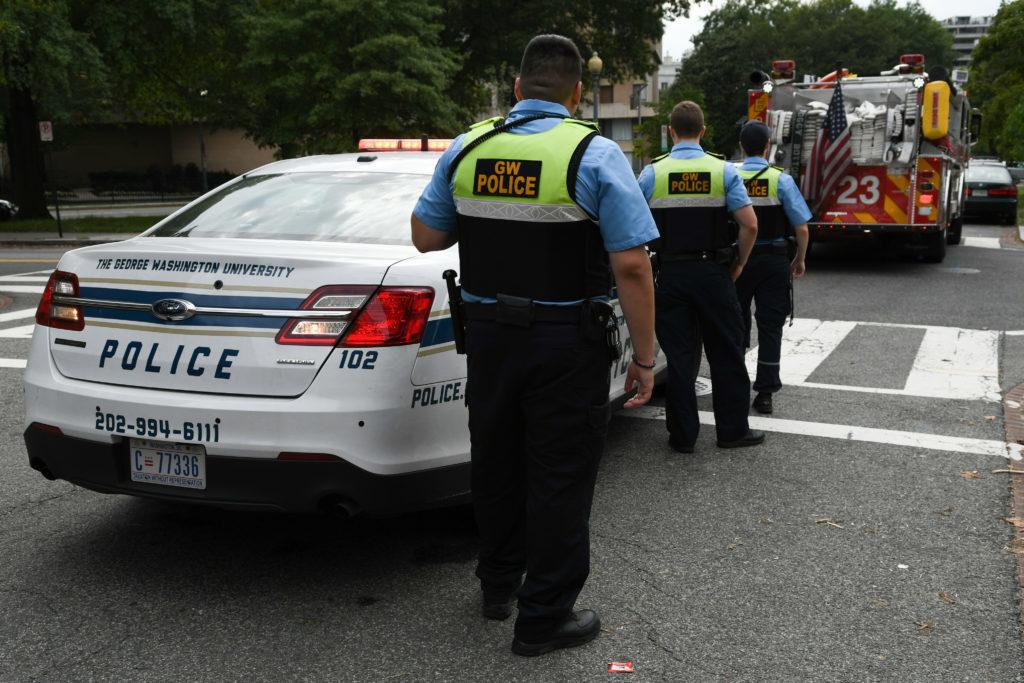Liquor law violations on campus have plummeted by more than 50 percent since last year – a decrease officials attributed to the introduction of a more lenient alcohol policy.
The GW Police Department filed about 200 fewer liquor law violations on the Foggy Bottom and Mount Vernon campuses compared to last year’s 375 liquor law violations, according to the annual security and fire safety report released Tuesday. Kathleen Fox, the assistant vice president of health and safety, said officials changed policies in 2018 to only cite students who were directly responsible for underage drinking, causing a steep decline in reported violations.
“In essence, we started doing that work on the front end to figure out who was underage or who was in violation of the code, rather than just sending everything to student rights and responsibilities to sort out,” Fox said.
After consulting with experts in campus policing, officials said they changed the reporting policy to only write up underage students who fail sobriety tests or students who hold events where underage drinking occurs. GWPD officers in 2017 cited all students in the presence of underage drinking, regardless of whether they were underage or inebriated.
Students complained in 2017 that the University’s alcohol policy hurt the relationship between students and GWPD officers and led to unnecessary trips to the emergency room.
Natalie Hipple, a criminal justice professor at Indiana University, said the shift in alcohol policy could reflect a shift in the University’s attitudes toward alcohol, looking at violations as a health problem rather than a legal problem.
“If they don’t have to charge you with it and there’s someone with you and they’re going to get you home and you’re not so drunk that you need to go to the hospital, like your life is not in danger,” Hipple said. “They’re taking a more different approach of ‘let’s just keep students safe.'”
She said only citing students who facilitate underage drinking helps police officers form better student-officer relationships, which will prompt students to feel more comfortable reaching out to officers during an emergency without fearing retribution.
“The tragedy is when they don’t call the police and somebody is so drunk, they don’t call the police, or even 911, someone dies because they’re scared they would get into trouble,” Hipple said.
Here are some of the highlights from the report:
Decrease in rape count
Reports of rape on the Foggy Bottom and Mount Vernon campuses decreased from 38 counts in 2017 to 25 counts last year, according to the report.
Fox said Title IX training at last year’s Colonial Inauguration program could have contributed to the uptick in rape reports in 2017 because students were informed where to find support on campus if a sexual assault did happen. Officials said last year that the uptick in rape reports in 2017 could have been a result of the prevalence of the #MeToo movement, prompting more people to speak up about their experiences.
Fox said the police department will add a new building on the Foggy Bottom Campus for the Office of Advocacy and Support, and officials are in the process of hiring an assistant director for the office. She said officials will announce the overhaul in the coming months once plans are finalized.
“We’re expanding our Office of Advocacy and Support so that we’re able to provide more support to survivors on campus,” she said. “We’ve got more prevention resources, and importantly, and then we’ve got more resources for anybody who wants to talk to them.”
Drug law violations increase, arrests dip
Disciplinary referrals for drug law violations have increased by about 10 counts per year for the past three years while arrests for drug law violations have decreased by more than half since 2016, the report states.
The report states that disciplinary referrals for drug law violations include reports students made either directly to GWPD or to the Office of Student Rights and Responsibilities.
University spokeswoman Crystal Nosal said she did not know the exact reason for the increase in referrals, but if drug law violation policies had changed, officials would have included it in the report.
“Then they’ve got to explain, ‘Hey, if something major has changed, that’s going to directly affect the numbers, it’s important to make sure that that’s in the report,’” she said.
John Rappaport, an associate professor at the University of Chicago Law School, said the uptick in referrals to corrective offices and downturn in arrests for drug law violations could show a push for officers to treat drug possession as a disciplinary and health issue instead of a criminal matter.
“There could be a roughly constant amount of drug activity going on, but the University has maybe made shifts in its policies about how to deal with it and is trying to keep more of it internal,” Rappaport said.
Jacinta Gau, a criminology professor at the University of Central Florida, said referrals for drug law violations could increase as low-level drugs like marijuana become more acceptable to socially use.
D.C. decriminalized marijuana in 2014. Mayor Muriel Bowser pushed to legalize marijuana sales in May, and at-large D.C. Councilmember David Grosso introduced similar legislation to the D.C. Council in January.
Gau said a decrease in drug law arrests could indicate a change in police policy to view low-level drug law violations as a disciplinary rather than criminal issue.
“One potential explanation is that the police are using kinds of diversion tactics,” she said. “Instead of arresting somebody, they’re trying to kind of scooch them into the disciplinary realm instead, to see if maybe the issue can be handled without marking the student with a criminal arrest on his or her record.”
Shannon Mallard and Yankun Zhao contributed reporting.




